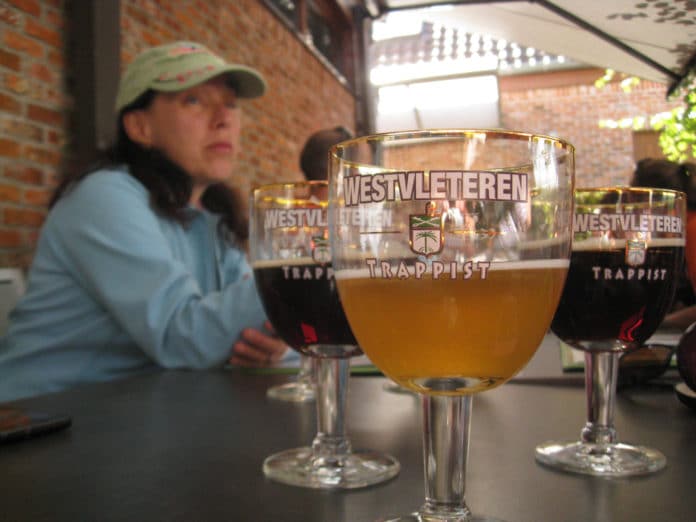Some men dream of one day owning their own bar or brewery, but Xavier Vanneste already had one – the De Halve Maan, or The Crescent in English.
Unfortunately, achieving one’s dreams often comes with its own obstacles. De Halve Maan sits in the city-center of Bruges, the cobblestone-laden, storybook town in Belgium. As Wired noted, the brewhouse is too small to contain its own bottling plant. And as beautiful as they might be, those small cobblestone streets make transportation a challenge. That might not have been an issue when the brewery opened in 1856, but trucks have a hard time slipping through the city’s narrow corridors to the bottling plant that, in 2010, moved about two miles away. Vanneste was stuck with a frustrating logistical problem.
Then, one morning he looked out his window to see construction workers laying underground cable. It hit him like a barrel-full of hops: build a pipeline.
“In the beginning, everyone thought it was kind of a joke,” Vanneste told The Washington Post in a phone interview. “Something like an underground beer pipeline would never be possible.”
So he spoke with some friends who are used to transporting a slightly more viscous liquid.
“I talked about it with some people I know in the oil and gas industry, and they said, ‘Why would it not be possible for beer?'” he said.
Not only is it possible, it’s opening this summer: A pipeline, much like the oil pipelines American politicians like to argue about, but instead of pumping black gold from place to place, this one would pump the sudsy stuff. But, as we’ve all learned from the longstanding debate surrounding the Keystone XL pipeline, they’re certainly not cheap. Beer sells pretty well, but Vanneste needed $4.5 million to build his pipeline.
So he launched a Kickstarter campaign. Requiring a way to incentivize backers to pledge the funds, he decided to give away free beer based on a membership hierarchy. The more you pledge, the more free beer you get. The highest membership class was gold, whose members needed to pledge at least $8,365. Those members will receive an 11-ounce beer every day for their entire lives, the Wall Street Journal reported.
He raised $335,000 and put up the rest of the money himself.
He also needed to persuade the Belgian government to build it.
“We didn’t even know who to ask,” Vanneste told The Post, but he set out to fill out the proper permits and convince local politicians that a private company should be able to build a pipeline under the city – after all, it’s far better for the environment than the trucks that would cough up pollutants with each shipment.
Finally, he had to build it.
The four-month construction hasn’t been easy. As Wired noted, the city’s streets turn and buckle around sharp corners, but Alain De Pré and his 30-person construction team needed 2,000 consecutive feet to connect the lengths of pipeline together. Then a deliriously perfect idea bubbled up: use the city’s many canals. The team fit disparate pieces of pipeline together by floating it on the water, then inserting the whole thing underground.
The construction even became a tourist attraction.
“The beer pipeline has become a sight,” De Pré told the WSJ. “People are taking more pictures of this than of the monuments around us.”
The roughly two-mile pipeline sleeps about six feet underground – 100 feet at some places – and is made from high-density polyethylene, a high-grade plastic that Vanneste assured The Post won’t affect the taste of the beer. It was the first thing he tested. The line can pump about 1,056 gallons (4,000 liters) each hour. It’s cleaned by pumping water and cleaning solution through the pipeline between each batch of beer.
The pipeline is finished and is now undergoing testing. Vanneste said he expects it to open in August. And sorry to those living along the route: You won’t be able to tap into the pipeline and set yourself up a nice home pub.
Many in Bruges, including Mayor Renaat Landuy, seem thrilled.
“The pipeline is a breakthrough,” Landuy said, adding that he would be open to more pipelines, including one for chocolate. “Everyone who proposes alternative means of transport is welcome here.”
The idea of a beer pipeline isn’t as crazy as it sounds. In Gelsenkirchen, Germany, bars in the Veltines Arena, a soccer stadium, are connected by a three-mile above-ground pipeline, which allows them to share kegs. And here in the United States, the Great Lakes Brewing Company in Cleveland is connected to its bar across the street via pipeline.
Vanneste told The Post he even sees potential down the road for it to be used for more than beer. Perhaps as a means to move clean water around.
Until then, cheers.






